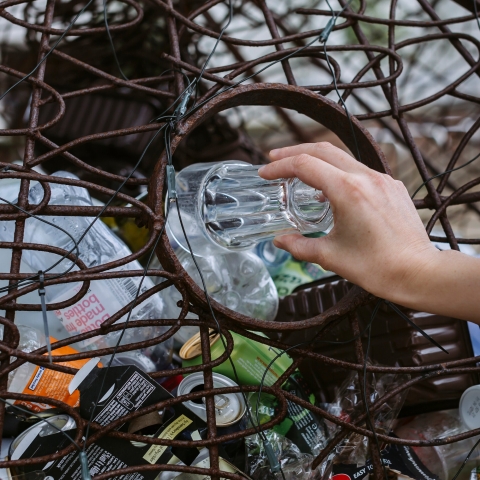

Everyone is invited to get involved with this year’s Plastic Free July, pledging to avoid single use packaging, target takeaway items, or go totally ‘plastic free’ for a month.
There are lots of places you can recycle different types of plastic in Portsmouth. However, University of Portsmouth research shows that recycling tackles only one part of the problem - it’s just as important for us to reduce the amount we use, and reuse what already exists.
Our tips this Plastic Free July include:
1 | Keep your reusable bags, cups and bottles by the front door
We all have them, stashed away in the kitchen - but in the rush to get to lectures or meet friends, it’s easy to forget them. Keep your reusable items near your shoe cupboard, house keys, in your bag or by your front door to make sure you don’t forget to grab them on your way out. Remember that bringing a reusable cup gets you a discount on your coffee at University cafes.
2 | Bulk buy where possible
Southsea’s own Package Free Larder is a great place to explore alternatives to plastic products. Whether it’s shampoo bars, wrapping paper, or dried pasta - there’s plenty available to stock up, and to reduce the amount of packaging you use on buying individual items. It’s usually more cost effective to buy in bulk too!
3 | Recycle your soft plastic
Many supermarkets have recycling points for soft plastics such as carrier bags and food packaging, which are easy to drop off when you’re doing your shopping. Local examples include:
- Co-op - Albert Road, South Parade,
- Tesco - Crasswell Street, Fratton Way,
- Waitrose - Southsea
Find more soft plastic recycling points near you on the Recycle Now website.
What the University is doing - Revolution Plastics
Researchers across the University have been working together to tackle the plastics crisis through Revolution Plastics.
We recently held a global conference to bring together different ideas and come up with solutions to plastic pollution. This includes holding the world’s first citywide plastics survey to map out problem areas of pollution, exploring the impact of plastic on livestock, and using puppets to communicate plastics issues.
Find out more about our work on Revolution Plastics.
Revolution Plastics: A message from Vice-Chancellor Graham Galbraith
How to be sustainable at uni
How to be a little greener while you're studying

Recycling in Portsmouth
One of the easiest things you can do to be sustainable at uni is reduce and recycle your waste.

Enable University alerts
Turn on notifications for critical updates like closures, safety alerts, and urgent service disruptions.





